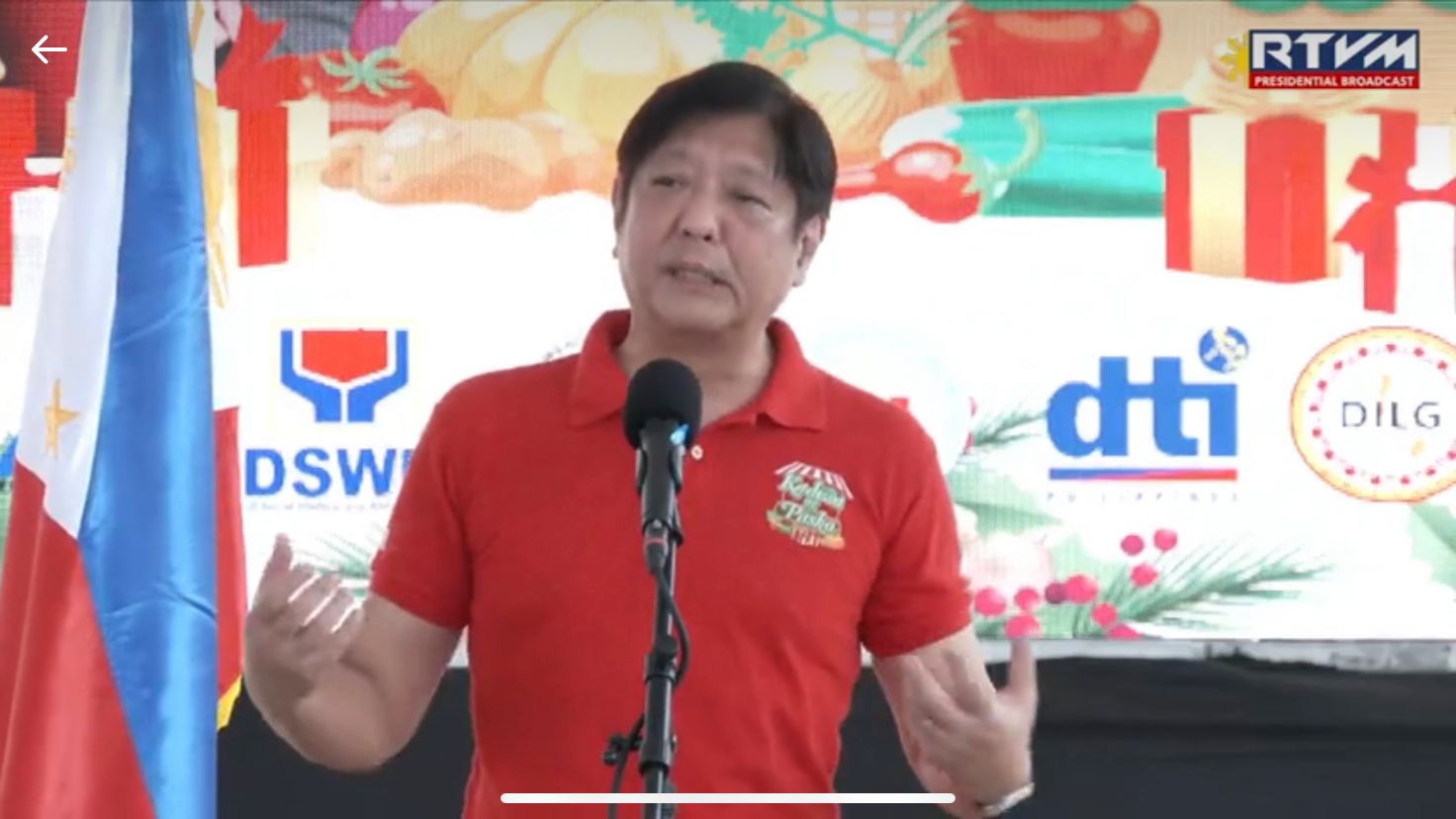
President Bongbong Marcos delivers speech at the launching of Kadiwa ng Pasko store outlets in Quezon City Hall on Dec. 1, 2022.
President Ferdinand “Bongbong” Marcos Jr. on Thursday said the Philippines was looking for other ways to explore for oil and gas in the West Philippine Sea, admitting that talks on joint exploration with China have reached a stalemate.
Speaking to reporters after leading the Kadiwa ng Pasko caravan in Quezon City, the President said the administration might veer away from government-to-government (G2G) talks with China.
“I think there might be other ways so it won’t be G2G. We’ll have to find a way because we really need it. The Philippines needs whatever we can find there,” Mr. Marcos said, referring to oil and gas in the resource-rich but disputed West Philippine Sea.
The President cited the long-standing maritime dispute between Manila and Beijing in the South China Sea as the “roadblock” in proceeding with the negotiations.
“What really happened there is what? Because China claims it (West Philippine Sea) as theirs, but it’s actually ours,” Mr. Marcos noted.
Beijing has sweeping claims in the South China Sea. In July 2016, however, the United Nations-backed international arbitral tribunal in The Hague clarified maritime boundaries and the Philippines’ sovereign entitlements, and in doing so, invalidated China’s claims to nearly the entire South China Sea.
China, which did not take part in the arbitration, does not recognize the ruling.
Resumption of talks
In November 2018, the Philippines and China signed a memorandum of understanding on joint oil and gas development in the West Philippine Sea, but President Marcos said the negotiations with China had reached an impasse because the Asian superpower wanted its own terms to be followed.
According to the President, the Philippines has been insisting that “the West Philippine Sea is ours and our law should be followed. But the Chinese are saying, ‘no that is ours, that is why we have to follow Chinese [laws].”
He admitted that the resources in the West Philippine Sea were a “big thing” for the Philippines “so we really need to fight for it and benefit if there is really oil there.”
In August this year, Foreign Secretary Enrique Manalo said the Philippines was willing to reopen joint oil exploration talks with China, “guided by our laws and our Constitution.”
In September, the Department of Foreign Affairs said Manila and Beijing already had “initial and general discussions” on the oil exploration but there were no “working level talks yet.”
In 2019, then President Rodrigo Duterte had claimed that Chinese President Xi Jinping had offered the Philippines a controlling stake in a proposed joint energy venture in the West Philippine Sea if it would set aside an international arbitral ruling award that went against China.
But his foreign secretary, Teodoro Locsin Jr., refuted this, saying China did not attach such a condition to the proposed joint exploration deal.
Locsin said the memorandum of understanding he signed with Chinese Foreign Minister Wang Yi “applies only in disputed areas, not in areas everyone, including China, admits belongs to the Philippines.”
Gas reserves
A target of the proposed joint venture with China is the development of gas deposits in Recto (Reed) Bank, located in the West Philippine Sea and within the Philippines’ 370-kilometer exclusive economic zone (EEZ) that is being claimed by China. This is particularly important considering that the reserves of the Malampaya gas field, which supplies fuel to several power plants in Luzon, is projected to be depleted in 2027.
Businessman Manuel V. Pangilinan’s oil and gas company PXP Energy Corp. holds a 50-percent interest in Service Contract (SC) 75, while its London-listed unit Forum Energy has a 70 percent participating interest in SC 72, two permits covering exploration in offshore northwest Palawan.
In April this year, however, the Department of Energy (DOE) ordered PXP to “put on hold all exploration activities for SC 75 and SC 72 until such time that the Security, Justice and Peace Coordinating Cluster (SJPCC) has issued the necessary clearance to proceed,” due to the harassment of the survey vessels hired by the service contractors and the negotiations with China.
The same month, the DOE confirmed the Cabinet-level SJPCC terminated negotiations with China. The SJPCC is composed of the secretary of national defense as chair and the secretaries of the interior and local government, foreign affairs, justice, as well as the executive secretary, national security adviser, and presidential adviser on the peace process as members.
Last Oct. 11, Energy Secretary Raphael Lotilla granted the declaration of force majeure on the work commitments for SC 75 and SC 72 effective from April 6 until such time it is lifted by the agency. This excuses PXP and Forum from performing their obligations and entitles them to an extension of the exploration period under the service contract, corresponding to the days contractors spent in preparation for the activities that were suspended in April.
RELATED STORIES
Notify DOE of West Philippine Sea oil and gas exploration plans, firms told
Isko Moreno open to oil extraction in WPS with Chinese private groups

